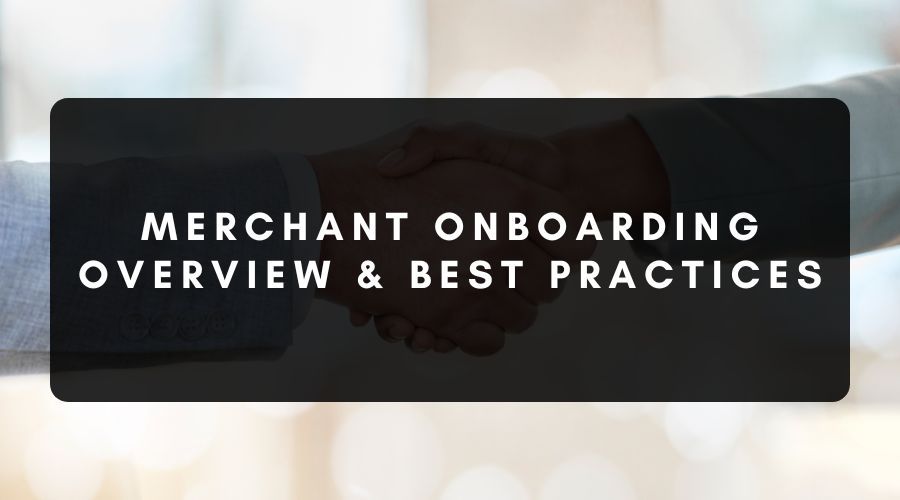
Merchant Onboarding Overview & Best Practices
If your business is considering integrating payment processing services into your current system, you will have to go through a merchant onboarding process. This is part of a legal process of due diligence on the part of a payment processor before they can approve you for merchant services. For legitimate businesses, the merchant onboarding process is nothing to worry about.
To facilitate the onboarding process, it is important to know what merchant onboarding is and what you will need to make the process as swift as possible. A reputable payment service provider will help you understand this process and work hard to get you the necessary clearance to start accepting sales electronically as soon as possible.
What Is Merchant Onboarding?
Merchant onboarding refers to the vetting process a business goes through when they sign up for payment processing services. For payment service providers, delivering their services to clients is more complicated than simply receiving a fee and supplying the promised service; providers of merchant services have to protect themselves against fraud by verifying the business as legitimate and identifying any red flags that may indicate fraudulent business patterns.
The process of merchant onboarding is not only to protect customers but also to protect your business. Going through a thorough vetting process will allow your business to benefit from all the security that comes with a merchant services account. Indeed, Europol recommends a safe means of payment as one of the top ways businesses and their customers can avoid becoming victims of fraud.
Merchant Risk Management
The payment service provider chosen by a business must conduct a thorough risk assessment before onboarding merchants. Ideally, the merchant risk assessment is done swiftly. However, high-risk merchants go through a more stringent risk assessment process and will also be subject to more stringent risk management procedures after onboarding.
Businesses that are considered “high risk” by payment processors include companies that operate in industries with a reputation for chargebacks or fraud. Businesses that sell event tickets and airline tickets are considered “high risk” because of the high risk of cancellations in these industries.
Best Practices for Merchant Onboarding
After a merchant applies for a global payment gateway or any other payment service, reputable payment facilitators will typically apply the following best practices:
1. Prescreening
The primary objective of prescreening is to immediately eliminate obvious scammers, fraudsters and criminal organisations. Payment providers complete this step before anything else to ensure everything is in order before moving on to a more thorough investigation.
2. Merchant KYC Process
The KYC (or Know Your Customer) process is an underwriting process that involves checking the legitimacy of a business. This process is done online and involves the business submitting documents that prove its legitimacy. Documents must demonstrate that the business exists and that it is functioning as a business.
The KYC process is an important step for both sides—firstly because providing this information is required by law, and secondly because any red flags that require further investigation can be looked into at this stage. Documents that support the KYC process include proof of identity and address documents, bank account details, business formation documents and anything else requested by the provider.
3. Merchant History Check
When a payment processor evaluates the company that is requesting a merchant account, the business’s past records and the management’s personal credit history will be investigated. This informs the payment services provider whether the people in charge are reliable borrowers and whether they or their company have anything worrisome in their financial history. Sometimes, a copy of their credit history may be required.
The payment services provider uses past sales as a benchmark for future business projections. For example, if a business clears €200,000 per year on average, but suddenly starts doubling that, this can flag potential fraud which the merchant services provider would then investigate.
4. Business and Operational Model and Web Content Analysis
If any irregularities have been identified during the merchant identity assessment, most payment processors will ask for a business and operational model analysis. These are typically required for higher-risk merchants. The payment service provider may also carry out a web content analysis at this stage to check the company’s web presence and responsiveness.
5. Information Security Compliance
If a merchant passes the provisional stage, they proceed to the operational stage. In this stage, the merchant must demonstrate that their website adheres to the latest network security requirements to ensure a smooth merchant onboarding process. If compliance is guaranteed, the merchant can integrate the provider’s payment gateway and start processing payments.
What Documents Are Needed for Merchant Onboarding?
Merchants who are applying for payment processing services may be asked to submit any of the following, and sometimes additional documents, depending on the payment service provider and the nature of your business.
Documents you need to open a merchant account typically include:
- Proof of identity for all individuals involved in your company
- Proof of address
- Registration documents based on the type of business you run (incorporation documents/certificates, LLP agreements, registration certificates and anything else related to your sector)
- Income tax returns
- Salary slips
- Bank statements
A Thorough Merchant Onboarding Process Opens the Doors to Safe, Global Payment Processing
Businesses that wish to receive online payments via different payment methods and in different currencies can benefit from the services provided by payment processing providers. Merchant services—including payment processing and a global payment gateway—can take your business to the next level by opening your doors to a global audience.
The merchant onboarding process is part and parcel of the due diligence required for merchant services providers to deliver the solutions you require. Businesses can help to speed up the process by having all of the relevant documents on hand and answering any queries straight away.

